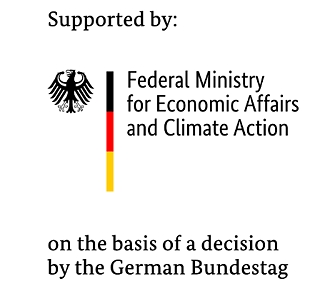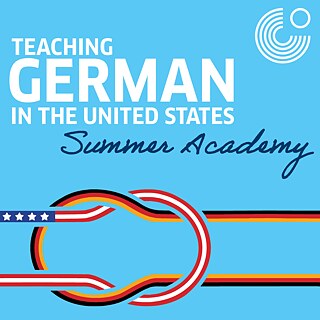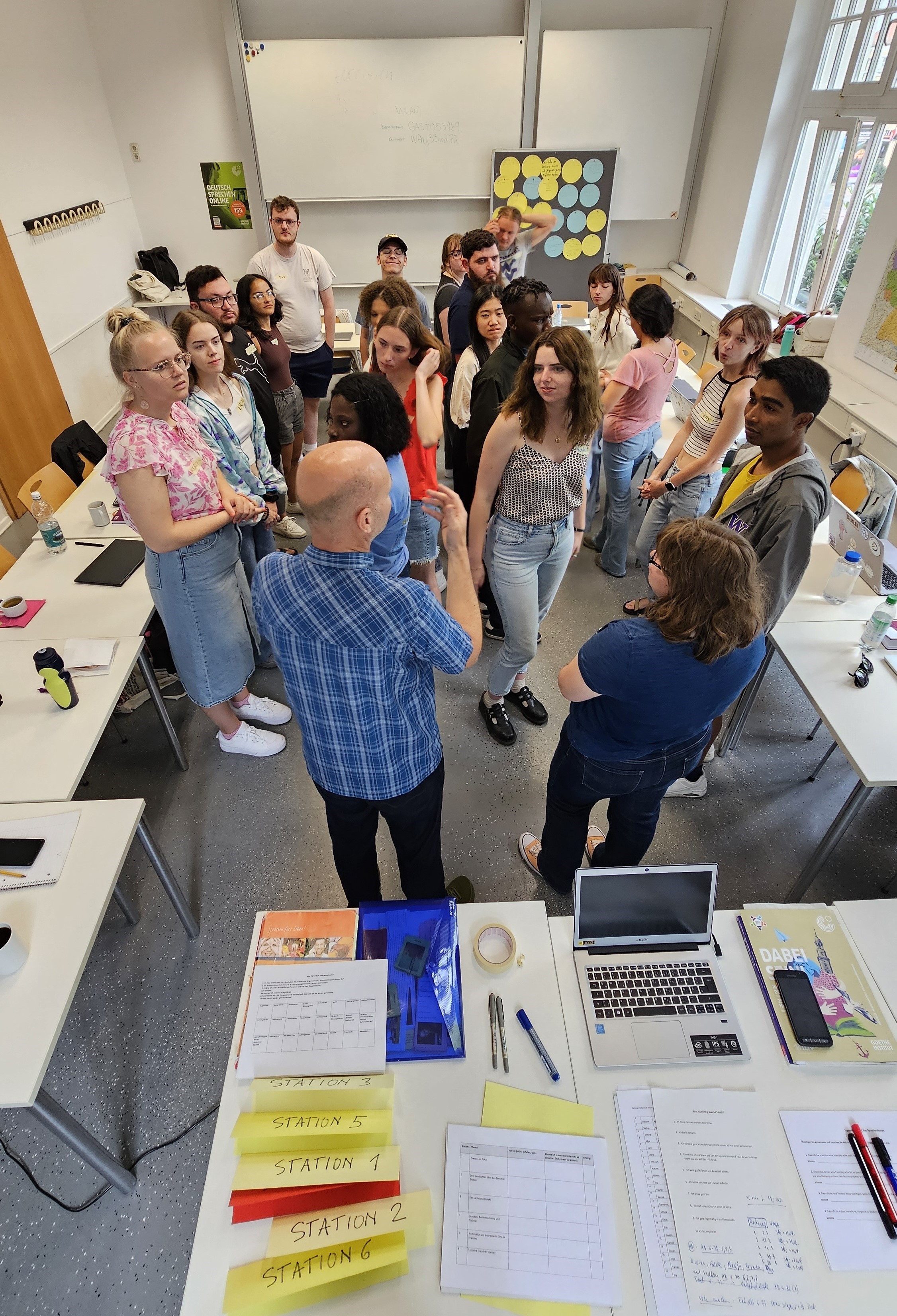Recaps 2023-2025
2025 - Cologne
Two intense weeks of learning, discovery, and new friendships came to an end on June 8, 2025.
spiring teachers and professionals transitioning into teaching from the U.S. had the opportunity to expand their knowledge, gain valuable experience, and explore the beauty of the region. The Summer Academy for US-American student teachers proved to be a great success. The project is funded by the Transatlantic Program of the Federal Republic of Germany with resources from the European Recovery Program (ERP) provided by the Federal Ministry for Economics and Climate Action (BMWK).
During an introductory walking tour, the group was introduced to Cologne’s unique humor and learned about the city's rich history in an engaging and entertaining way. A visit to the NS Documentation Center offered a powerful and sobering insight into the lasting significance and repercussions of National Socialism. A workshop at DOMiD (Documentation Center and Museum on Migration in Germany) provided an introduction to Germany’s post-1945 migration history. Visiting this archive, the first of its kind, underscored the importance of ongoing engagement with Germany’s culture of remembrance in order to present a contemporary and inclusive image of Germany in the German classroom. Through these immersive experiences, participants were able to explore German history on site, engage with Cologne’s cultural identity, and gather authentic teaching materials.
Visit to the University of Cologne and the Lessing-Gymnasium
A highlight of the Summer Academy was the visit to the University of Cologne. The students participated in joint and specially designed workshops and lectures, led by esteemed instructors from the University’s Center for Teacher Education. These sessions offered opportunities to deepen theoretical understanding, explore innovative teaching methods, and engage in academic exchange with local students.
Another key element of the program was the visit to the bilingual Lessing-Gymnasium in Cologne. Here, the U.S. students observed classroom teaching and had the chance to actively participate. Dedicated teachers shared their experience and offered valuable insights into daily school life. A particularly memorable moment was when participants had the opportunity to design and deliver their own short teaching segments, which were met with enthusiasm by the students.
The Siebengebirge Cultural Landscape
A special highlight was the excursion to the Siebengebirge mountain range. The breathtaking landscape provided not only a welcome break from the academic sessions but also a chance to reflect on nature as a pedagogical space. Through hiking and team-building activities, participants strengthened key competencies as future educators such as collaboration and communication skills.
The Summer Academy concluded with a methodological-didactic workshop at the Goethe-Institut Bonn, where participants presented the insights and experiences they had gained. “The Summer Academy helped us grow professionally and personally,” said one participant. “The connections and experiences will stay with us for a long time.”
The Summer Academy team, Dr. Susanne Rinner and Michael Thompson, also expressed their satisfaction with the program and emphasized the importance of initiatives like this for teacher education. “Supporting future teachers is an investment in the future of the American education system,” they stated. “We are proud that the Summer Academy contributes to strengthening German language instruction in the U.S. and deepening transatlantic dialogue between our countries.”
Returning to their home universities with new perspectives and renewed motivation, the participants are now ready to bring these experiences into their future classrooms. The Summer Academy in Cologne clearly demonstrated the value of practice-oriented, interdisciplinary formats for the next generation of teachers and the broader professional exchange between the U.S. and Germany.
Pictures
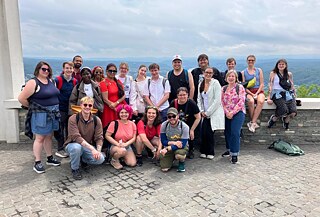
Group photo of the Summer Academy and leadership at the top of the Drachenfels | © Goethe-Institut
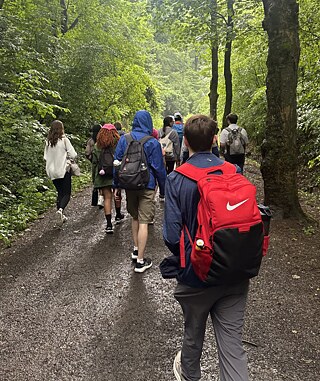
Summer Academy participants hiking on a trail in the Siebengebirge | © Goethe-Institut
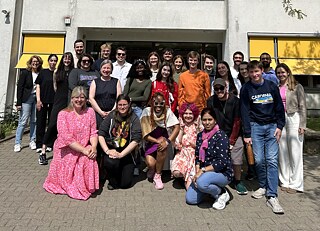
Group photo of the Summer Academy participants and leadership in front of the Lessing-Gymnasium with a teacher and the school director | © Goethe-Institut
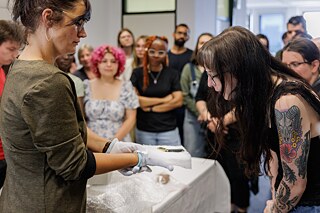
The research associate for Education and Outreach at DOMiD presents an object from the archive to the Summer Academy participants | © Goethe-Institut
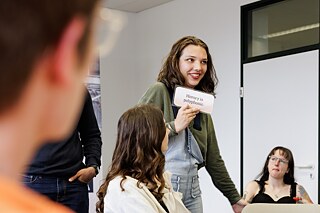
A Summer Academy participant showing a card with the prompt “History is polyphonic” at the visit to DOMiD | © Goethe-Institut
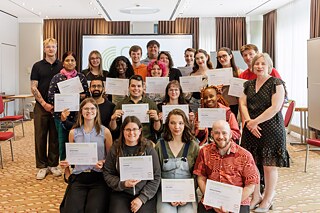
Group photo of the Summer Academy participants and leadership with the certificates of completion of the program | © Goethe-Institut
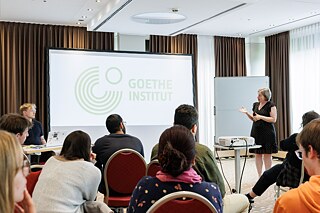
The Summer Academy participants in a seminar from the Goethe-Institut while in Cologne | © Goethe-Institut
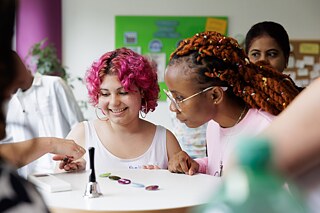
Participants of the Summer Academy at a “speed-dating” activity with language course participants at the Goethe-Institut in Bonn | © Goethe-Institut
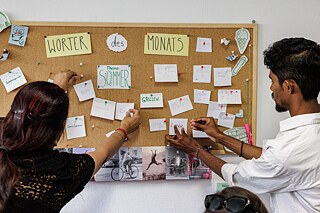
A Summer Academy participant and a language course participant hang cards on a bulletin board for the words of the month | © Goethe-Institut
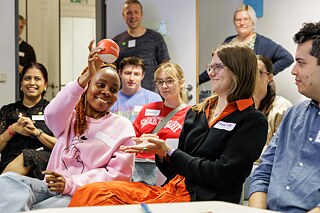
Summer Academy participants taking part in a pedagogical icebreaker game at the Goethe-Instiut in Bonn | © Goethe-Institut
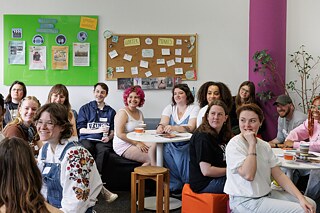
Participants of the Summer Academy at a “speed-dating” event with language course participants at the Goethe-Institut in Bonn | © Goethe-Institut
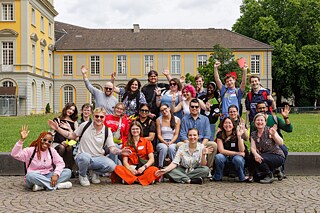
Group photo of the Summer Academy participants at the University of Bonn | © Goethe-Institut
2024 - Dresden
Two intensive weeks full of learning, experiences and new friendships came to an end on June 21, 2024. Young prospective teachers and career changers had the opportunity to expand their knowledge, gain valuable experience and discover the beauty of the region. The summer academy for US student teachers proved to be a complete success. The project is funded by the Transatlantic Program of the Federal Republic of Germany with funds from the European Recovery Program (ERP) of the Federal Ministry of Economics and Climate Protection (BMWK).
Young prospective teachers and career changers had the opportunity to expand their knowledge, gain valuable experience and discover the beauty of the region.The city of Dresden as a place of learning
During the official welcome, Antje Beutekamp from the International Affairs Department of the City of Dresden emphasized the importance of Dresden as an international location for education, business and exchange. Visits to museums, the Frauenkirche, an opera performance of Don Carlos in the Semper Opera House and memorial sites that reminded participants of Dresden's eventful history allowed them to collect authentic teaching materials and engage with Dresden's cultural history and present day.
Visit to the TU Dresden and the Friedrich-Schiller-Gymnasium Pirna
One of the highlights of the summer academy was a visit to the Technical University of Dresden. The students took part in joint workshops and lectures designed especially for them, which were led by renowned lecturers from the Center for Teacher Training, School and Vocational Education Research. They were not only able to deepen their theoretical knowledge, but also learn about modern teaching methods and innovative approaches to teaching.
Another important part of the program was the visit to the Friedrich-Schiller-Gymnasium in Pirna. Here, the student teachers were able to experience and observe practical lessons. The dedicated teachers at the grammar school provided valuable insights into everyday school life and shared their many years of experience. Particularly impressive was the opportunity to design and conduct small teaching units themselves, which was received with great enthusiasm by the students.
Natural wonders: Saxon Switzerland National Park
The excursion to Saxon Switzerland was a particular highlight. The impressive landscape not only provided a welcome counterbalance to the intensive learning phases, but also the opportunity to reflect on nature experiences in an educational way. During hikes and team activities, the participants were able to strengthen their teamwork and communication skills - skills that are of great importance in the future teaching profession.
A methodological and didactic workshop at the Goethe-Institut Dresden rounded off the Summer Academy, at the end of which the participants presented their experiences and newly gained knowledge. "The summer academy not only helped us develop professionally, but also enriched us personally," said one participant. "We will remember the encounters and experiences for a long time to come."
The organizers of the Summer Academy, Dr. Susanne Rinner and Dr. Cordula Hunold, were also very satisfied with how the Summer Academy went and emphasized the importance of such initiatives for teacher training. "Supporting young student teachers is an investment in the future of the American education system," explained Dr. Hunold. "We are pleased to be able to contribute to strengthening the teaching of German in the USA and the transatlantic dialog between the USA and Germany with the Summer Academy."
With many new impressions and strengthened commitment, the young student teachers are now returning to their home universities, ready to incorporate the experience they have gained into their future teaching activities. The summer aca
demy in Dresden has shown how important and enriching practice-oriented and interdisciplinary learning formats are for the training of the next generation of teachers and the exchange of specialists.
Article from the TU Dresden
Our partners at the TU Dresden also published an article on the visit of the student teachers from the USA as part of the Summer Academy 2024. You can read their article here:
https://tu-dresden.de/zlsb/die-einrichtung/news/lehramtsstudierende-aus-den-usa-zu-gast-am-zlsb
Pictures
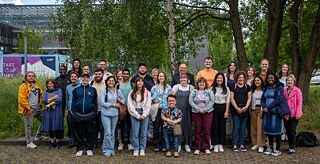
Visit at the Technische Universität Dresden | © Goethe-Institut
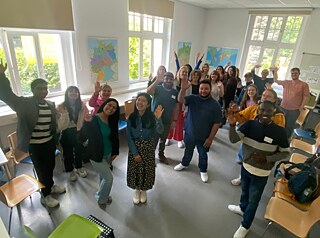
Der erste Tag. Gegenseitiges Kennenlernen | © Goethe-Institut
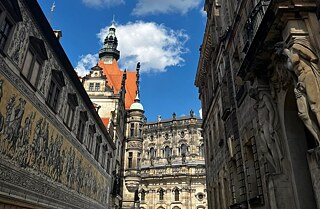
Stadtführung durch Dresden: Der Fürstenzug | © Goethe-Institut
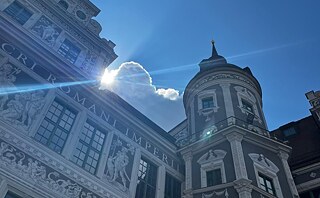
Stadtführung durch Dresden: Das kurfürstliche Schloss | © Goethe-Institut
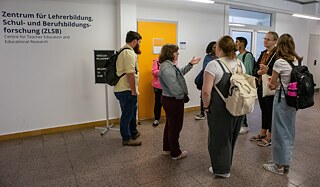
Rundgang durch das Zentrum für Lehrerbildung, Schul- und Berufsbildungsforschung (ZLSB) der TU Dresden | © Goethe-Institut
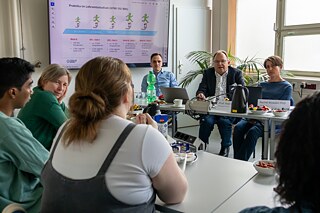
Begrüßung durch Herrn Prof. Dr. Axel Gehrmann, Geschäftsführender Direktor des ZLSB | © Goethe-Institut
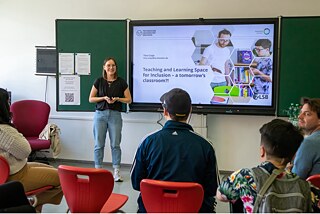
Überblicksvortrag zum Thema Inklusion und Innovation im Klassenzimmer | © Goethe-Institut
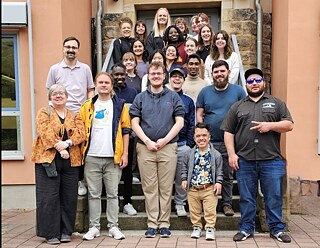
Besuch des binationalen Friedrich-Schiller-Gymnasiums in Pirna mit Begrüßung durch den Schulleiter Herr Dr. Kristian Raum | © Goethe-Institut
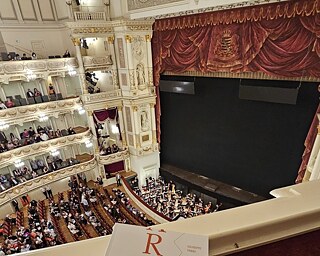
Die Oper als außerschulischer Lernort: Don Carlos in der Semperoper | © Goethe-Institut
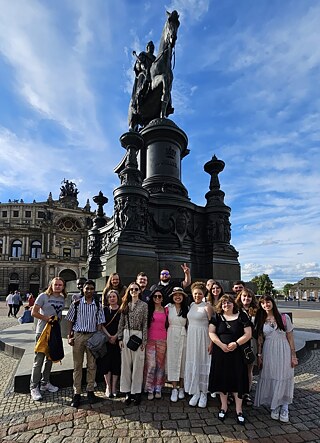
Vor der Aufführung von Don Carlos in der Semperoper | © Goethe-Institut
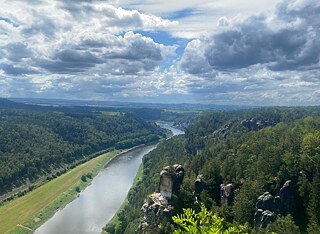
Ausblick von der Basteibrücke | © Goethe-Institut
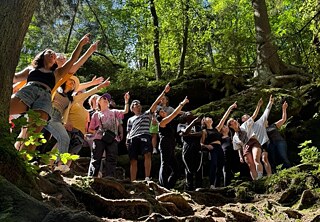
Auf den Spuren Caspar David Friedrichs | © Goethe-Institut
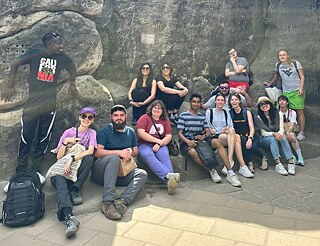
Rast nach der Wanderung auf der Bastei | © Goethe-Institut
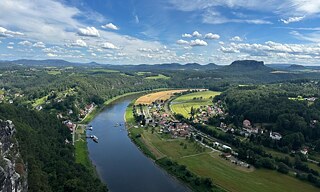
Blick auf den historischen Raddampfer, mit dem wir nach Dresden zurückfahren | © Goethe-Institut
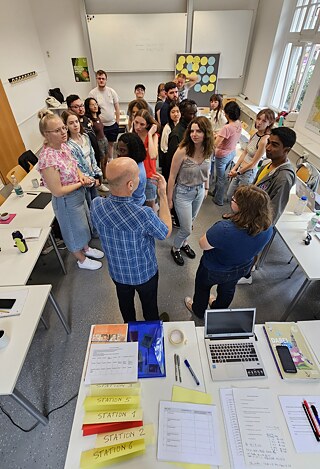
Fortbildung am Goethe-Institut Dresden | © Goethe-Institut
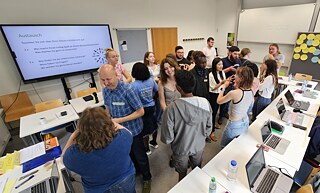
Austausch und Dialog über die Arbeit von Deutschlehrkräften | © Goethe-Institut
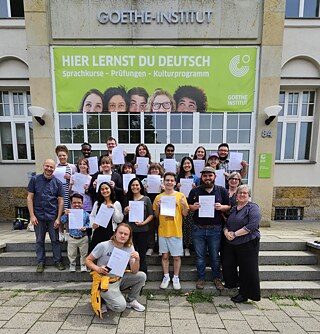
Erfolgreicher Abschluss der Sommerakademie 2024 | © Goethe-Institut
2023 - Bremen
In August 2023, the Summer Academy was held in Bremen, where participants spent 11 days exploring the area, engaging in lively conversations about sustainability and migration, and preparing materials to integrate these topics into the German classroom at US schools and universities. The Summer Academy for US-American student teachers was filled with learning and teaching experiences, adventure, and new friendships. The project is funded by the Transatlantic Program of the Federal Republic of Germany with funds from the European Recovery Program (ERP) of the Federal Ministry of Economics and Climate Protection (BMWK). Young prospective teachers and career changers had the opportunity to expand their knowledge, gain valuable experience, and discover the importance of the city-state of Bremen.
The City of Bremen as a Place of LearningIn his welcome speech, Mr. Christian Buchberger, Deputy Director of the State Institute for Schools, emphasized the importance of Bremen as an international location for education, business and exchange. The aspects of teacher training in Bremen were discussed in particular detail. Visits to museums and memorial sites, which reminded participants of Bremen's eventful history, allowed them to collect authentic teaching materials and to engage with the cultural history and current state of Bremen and the significance of the city as a UNESCO World Heritage Site. In a workshop on the topic of cultural memory, the participants had the opportunity to approach history in a self-reflective way and get to know interactive forms of teaching and learning that can be integrated into German lessons.
Combating Poverty and Integration
The visit to the Senator for Social Affairs, Youth, Integration and Sport on the subject of social security systems in Germany and programs to combat poverty allowed the participants to find out about Bremen's approach and, in particular, the importance of state entitlements to social benefits. This was followed by a visit to Werkstatt Bremen to experience the work of integration on site. After a guided tour of the workplaces, the visitors enjoyed homemade coffee and cake and learned about the foundation and existence of the workshops in Germany, which gear their work to the needs of the people who work there and at the same time have to take economic considerations into account.
Integrated Learning
The aim of the training course was to combine the basics of methodological and didactic work with the design of authentic teaching materials. The visit to the exhibition "Generation. Jugend trotz(t) Krise" exhibition at the Kunsthalle Bremen enabled the participants to integrate the topic of art into German as a foreign language lessons and to develop their own teaching outlines, which were presented and shared on the last day of the summer academy
Migration
During a guided tour of the German Emigration Center Bremerhaven on the topic of German-American migration history, the participants learned about the history of emigration from Bremen to overseas. They were able to relate the experience of today's Germany as a country of migration to their experiences in the USA. Those participants whose family members emigrated from Germany to the USA had the opportunity to research the migration history of their own family with reference to Germany. This made the visit an exploration of the connections between official and personal history.
Natural Wonders: Wadden Sea National Park
A special highlight was the excursion to the Wadden Sea. The visit to the Blue Classroom, an extracurricular place of learning, not only provided a welcome balance to the intensive learning phases, but also the opportunity to reflect on nature experiences in educational terms. During the guided mudflat hike, the participants experienced first-hand how important the topic of sustainability in the sense of the 17 UN goals is, especially in German lessons, in order to combine language learning with relevant topics such as climate protection.
The Summer Academy concluded with a festive closing event at which the participants presented their experiences and newly gained knowledge. "The Summer Academy not only prepared us for the profession of German teacher, but also allowed us to make friends with future German teachers," said one participant. "The conversations and experiences of this trip will stay with us for a long time."
The organizers of the Summer Academy, Dr. Susanne Rinner and Dr. Anne Schönhagen, were also very satisfied with how the Summer Academy went and emphasized the importance of such initiatives for teacher training. "Supporting young student teachers is an investment in the future of our education system," explained Dr. Schönhagen. "We are delighted to be able to support future German teachers and thus German teaching in the USA with the Summer Academy. This program makes a sustainable and forward-looking contribution to the transatlantic dialogue between the USA and Germany."
With many new impressions and strengthened commitment, the young student teachers are now returning to their home universities, ready to incorporate the experience they have gained into their future teaching activities. The summer academy in Bremen has shown how important and enriching practice-oriented and interdisciplinary learning formats are for the training of the next generation of teachers and the exchange of specialists.
Pictures 2023
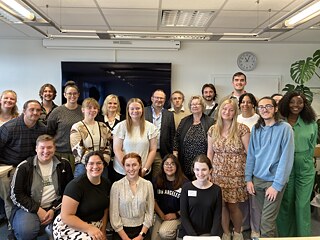
Besuch bei der Bremer Senatsabteilung für Soziales, Jugend und Integration | © Goethe-Institut
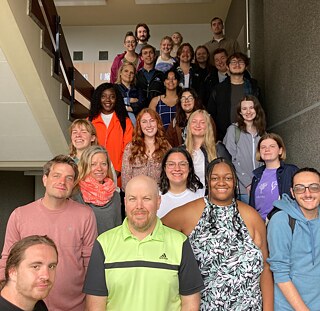
Am Bremer Landesamt für Schule | © Goethe-Institut
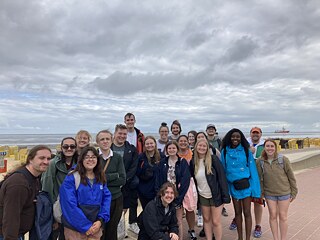
Am Wattenmeer im Blauen Klassenzimmer | © Goethe-Institut
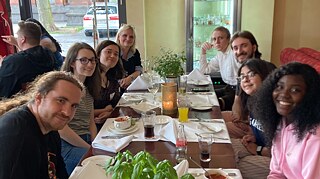
Ankunft in Bremen | © Goethe-Institut
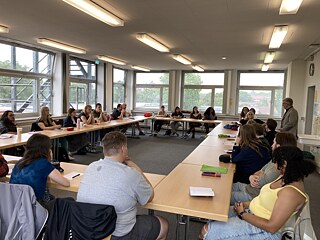
Begrüßung im Landesinstitut für Schule | © Goethe-Institut
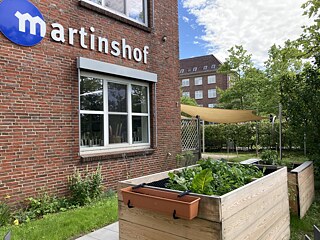
Besuch beim Martinshof Werkstatt Bremen | © Goethe-Institut
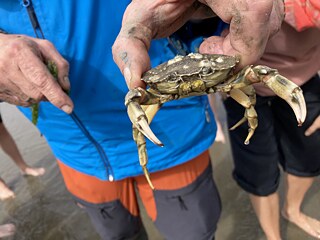
Das blaue Klassenzimmer im Wattenmeer bei Cuxhaven | © Goethe-Institut
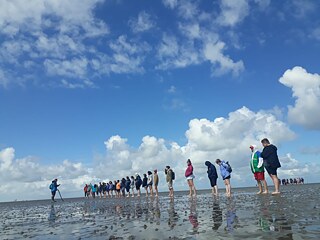
Das blaue Klassenzimmer | © Goethe-Institut
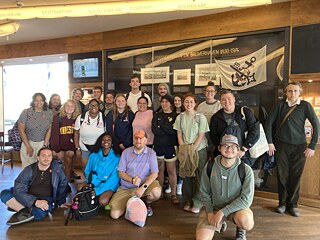
Deutsches Auswandererhaus Bremerhaven | © Goethe-Institut
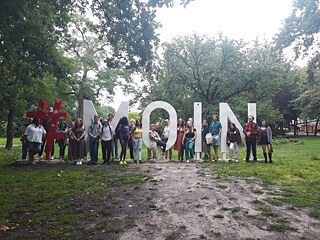
Ein Moin sagt mehr als 1000 Worte | © Goethe-Institut
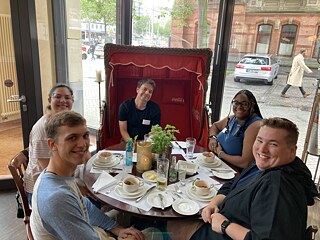
Essen im Strandkorb | © Goethe-Institut
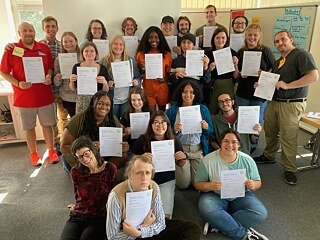
Fortbildungszertifikate | © Goethe-Institut
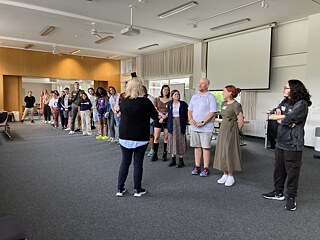
Gegenseitiges Kennenlernen | © Goethe-Institut
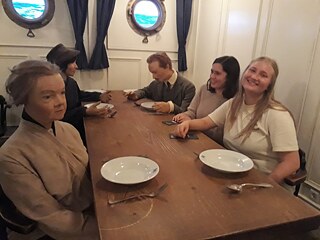
Imagine Auswanderung in die USA | © Goethe-Institut
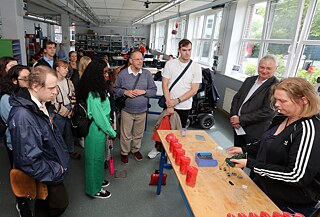
Kerzenherstellung in der Werkstatt Bremen | © Goethe-Institut
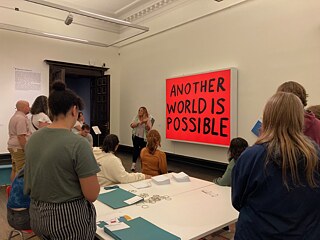
Kunsthalle in Bremen | © Goethe-Institut
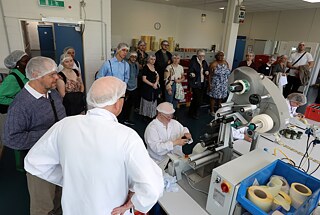
Lebensmittelverpackung in der Werkstatt Bremen | © Goethe-Institut
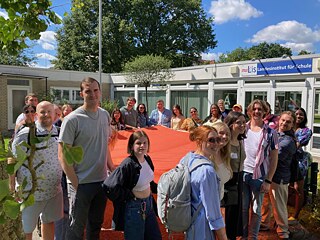
Monumental Bag | © Goethe-Institut
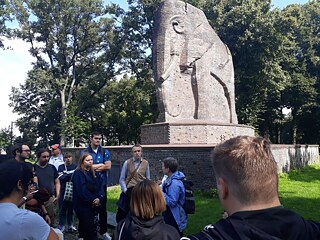
Workshop Monumental Bag Kulturelles Gedächtnis und Erinnerung | © Goethe-Institut
